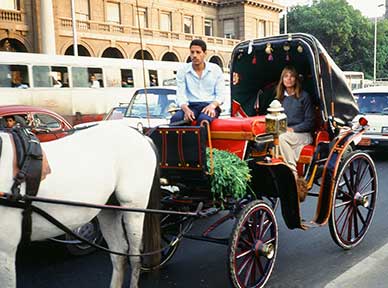Egyptian Hustlers
April 19 - 25, 1988
In Egypt, the hustlers wouldn't leave us alone. They gathered around us in hoards, demanding our attention, demanding answers to their questions. They refused to be brushed off and were positively nasty when we didn't do exactly what they wished, which generally involved giving them money.
A little money wouldn't do. Even beggars had expectations. "Baksheesh" (an Arabic word for "share the wealth") was demanded by everyone for every little thing. Once we took off our shoes to visit a mosque in Cairo. When we went to reclaim them, a man demanded substantial baksheesh for "guarding" them, as if anyone would take our worn and ragged shoes from the entryway to a mosque in the middle of the day! He didn't get his baksheesh, and he didn't take it well.
Another man wanted baksheesh for escorting us into a pyramid for which we'd already paid admission. He reminded us that it was Ramadan, the Muslim month of fasting. When we refused, he followed us, moaning and crying, "Ramadan, Ramadan."
 When our train arrived in Luxor, we were accosted by some fifty "hantour" drivers. Hantours are horse-drawn cabs. The drivers were like a hoard of wasps we couldn't shake off. We couldn't get a moment to talk with each other in peace about where we wanted to go. My patience gave out and I screamed at them to leave us alone.
When our train arrived in Luxor, we were accosted by some fifty "hantour" drivers. Hantours are horse-drawn cabs. The drivers were like a hoard of wasps we couldn't shake off. We couldn't get a moment to talk with each other in peace about where we wanted to go. My patience gave out and I screamed at them to leave us alone.
As we walked through town, hantour drivers would shout at us, "Taxi, taxi," and even follow us around watching our every move, trying to lure us aboard. We eventually did utilize the hantours, when it was possible to talk to one driver at a time (see photo).
"How much to Karnak Temple?" asked Dennis.
"Four pounds," answered the driver.
"Sorry, too much. We'll pay you two pounds."
"Four pounds."
"OK, we'll walk."
Another driver chased us down the street. "I'll take you for two pounds," he shouted. We got in.
"Two pounds each."
We started to get back out.
"OK, OK, two pounds." He chuckled as if it had been a grand joke, and the horse trotted down the street. We passed a beautiful modern building.
"That must be the Luxor Museum we read about in the guidebook," I commented.
"Yes," said the driver, slowing the horse. "This is the museum. Two pounds to the museum."
"We are going to Karnak Temple! You agreed to charge us two pounds to the temple," Dennis insisted.
"No, no, no. You said you wanted to go to the museum!" he argued, looking hurt.
We again started to get out. I was furious.
"OK, OK, three pounds to the temple," he said. We paid it.
Another time a man was selling postcards—10 for a pound. Dennis handed him an Egyptian pound (after all, we were in Egypt). He said, "No, no, pound sterling!" (worth $1.85 versus $.45 for an Egyptian pound).
We never did figure out all the tricks.
Not that every Egyptian tried to cheat us. Once, in a back alley in Cairo, we asked a shopkeeper for a bar of soap. The man didn't understand English, so he went to some other shops to get help in translating. Once we got the message across, he referred us to his friend at another shop, who went upstairs and brought down a large bar of Lux.
The next communication challenge was determining how much to pay. Dennis took out a pound note and held it up with a questioning glance. They nodded OK and we started to walk away. They called us back, not allowing us to go. Did they want more money? A pound was sufficient, and they had seemed to agree when we showed it to them.
We couldn't figure out what was happening, and I was becoming upset. We wanted to move on. Finally, a man returned with change and gave it to Dennis, sealing the deal with a strong, friendly handshake.
What a gentleman! It's never safe to make assumptions concerning people's motivations.
Go on to Letter Home from the Holy Land
Source: www.SusanCAnthony.com, ©Susan C. Anthony
